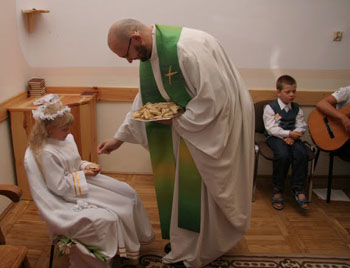In this edition of "Cult Fiction 20 Years Later" (or "The Annotated Cult Fiction," if you prefer), we look at a very brief section entitled "Cruel Deceit of the Rank and File." Here, Graham Moorhouse accomplishes two things: he addresses a very real problem with the Neocatechumenal hierarchy, and he also addresses a much bigger problem in the Church at large. The point about the Neocat hierarchy (Kiko, Carmen, etc.) is well-known and there won't be too much else to say on it. As for the deeper problems, those far exceed the scope of this particular post, but we'll offer a small slice of commentary, anyway.
The most evil aspect of the Neocatechumenate is their calculated deceit of their own rank and file who are for the most part clearly exemplary good people. (Cult Fiction, p. 9)
Is this the most evil characteristic about the Way? It is evil without question, but we know some blood-boiling stories that have nothing to do with "deception." Perhaps Moorhouse, at the time of his writing, had been mercifully spared those types of stories.
But yes, your average rank-and-file Neocat is a very decent and faithful person. They are looking to grow in their life of faith, and so when they see advertisements for a catechesis that offers answers to life's suffering and offers a close-knit community of like-minded believers, they're all too happy to sign up. They turn their lives and livelihoods over to their catechists because they sincerely believe that to do so is to serve God, which they rightly recognize as their highest good. No one wants to join a cult - it's only the lucky few who one day wake up and realize that's where they've ended up.
Most Neocats get pulled straight from the Sunday pew at the local Catholic parish and - by and large - they believe the same things the Catholic Church believes. If they knew beforehand and up front what awaited them down "the Way," they would shake the dust from their sandals and go a different way. This understanding is a big part of why this blog exists: so you don't have to be deceived; so you can have questions answered that the Kikatechists will only discourage, deflect, and ignore.
Moorhouse goes on to call Kiko and Carmen "professional dissenters," and proceeds to lump them in this general category which he then spends the majority of the rest of this section describing. What he writes, again, is less of a commentary on the Way itself (though its tactics certainly fit the bill) and more of a commentary on a widespread phenomenon we see in the Church at large.
If you want to change the beliefs of Catholic[s], it is a waste of time doing it honestly and out in the open. This will merely bring the Magisterium of the Church down on your head. (Cult Fiction, p. 9)
I feel like this might have been a bit truer 20 years ago. St. John Paul II, naive as he perhaps could be at times to the subtle machinations of his underlings, had little patience for heterodoxy and confusion. Francis, however, seems to welcome and encourage it. The world and the Church, reflections of one another in many ways, grow less and less subtle all the time.
What you must do is change the orthopraxis that underpins and gives expression to the beliefs you want to change... For instance, if you do not believe in transubstantiation, encourage Catholics to receive the host in the hand standing.... The trick is never to reveal your hand, just be very patient and leave time to do your corrosive dirty work. (Cult Fiction, p. 9)
First, the larger point; then, the example.
So, so much could be said about the subterfuge and sabotage of Catholicism. From Fr. James Martin's serpentine tweets to Cardinal Bernardin's "Seamless Garment," from Bella Dodd to secret Communist memoirs...there are so many directions to go and so little time. We encourage the reader to read more deeply than beyond just this blog, and also know that Moorhouse's point about undermining doctrine and playing the long game is SPOT ON.
Now, as to the example. Moorhouse actually gives several, all of which relate to the Way in some form or another, but we'll focus our attention on communion in the hand.
It is certainly all too likely that Kiko and Carmen reject transubstantiation. As indicated in a past article, modernists like Fr. Thomas Reese, S.J. admit their rejection openly. The Dutch Catechism and its deficient theology, including on the Real Presence, formed decades of modern Catholics (including Kiko). When a certain pandemic hit the world in 2020, what was one of the first things to go? Communion on the tongue. The reason was ostensibly hygiene and preventing the spread of germs. But come on, now.
Martin Mosebach once poignantly wrote:
If people who have been kneeling for a thousand years suddenly get to their feet, they do not think, "We're doing this like the early Christians, who stood for the Consecration;" they are not aware of returning to some particularly authentic form of worship. They simply get up, brush the dust from their trouser-legs and say to themselves: "So it wasn't such a serious business after all." (The Heresy of Formlessless, p. 30)
You can argue all you want for "community banquets" and "festive meals" and "mature friendship with Christ" and whatever else, but at the end of the day, it's just going to end up as "just another no-big-deal." As Bishop Athanasius Schneider writes, "A commonplace gesture has no pedagogical effect that could help increase the sense of the sacred." If you're receiving Holy Communion in the hand standing (or in the Neocat fashion, seated and self-communicating for snack time), you're not inculcating any deeper, more sophisticated sense of reverence; you're just going through the same motions you do with anything else, and so will of course think about it like anything else. And that, dear friends, is the long game: that's been the goal all along.
Maybe Moorhouse was correct in his first analysis: that the cruel deceit of the rank and file really is the evilest characteristic of the Way. When the depths of deception undermine the very tenets of one's faith, unknowingly forcing them to follow a false Gospel that imperils their very soul, even the most horrific bodily abuse seems tame by comparison. The Neocatechumenal Way is not the Catholic faith, despite its outward similarities (not to mention its loud, strident claims that it is the only Catholic faith). That is the real deception.
In the next installment, we'll look at Moorhouse's breakdown of five slick sales tricks used by the Way to sell its distorted brand of liturgy.
To read other entries in this series, see: Part 1, Part 2, Part 3, Part 6, Part 7, Part 8, Part 9.


No comments:
Post a Comment